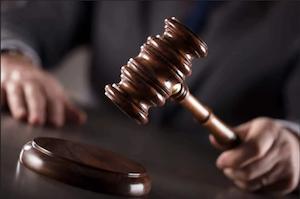One of the things clients are frequently worried about is whether they will need to talk when they are in court. Court is a an unfamiliar setting that can cause a lot of worry, especially if you might have to stand up in front of a judge and a courtroom full of other people and speak. Using an experienced criminal justice attorney will have you prepared.
So will you have to say anything in court? The answer in the vast majority of cases is “not at all” or “very little.” Here is an overview of the most common scenarios:
“Discovery Hearing” or “First Time Up”
Whether you are charged with a felony or misdemeanor, the first time you appear in court with your Virginia criminal lawyer is typically not a trial. Rather, it is what lawyers refer to as a “first time up” or discovery hearing” where your lawyer is making sure they have received all the discovery in your case, is talking to a prosecutor (maybe for the first time) about your case, and picking the next date to come to court. These hearings often result in a new date being chosen and you will need to do nothing more than stand next to your lawyer as they set the next date in front of a judge.
Plea Hearing
What happens if you reach a plea agreement in your case? Will you need to talk in court then? The answer is yes, but not about the details of your case most of the time. When a person decides to enter into a plea agreement (that is, a compromise with the prosecution) they must then go in front of the judge. When a person pleads guilty to a charge, the judge will ask a series of questions to ensure that you understand your rights, the consequences of pleading guilty, and that no one is forcing you into that decision. The vast majority of the time these are simply “yes” or “no” questions that are ALSO found on a document you will review with your lawyer and sign before you go into the courtroom. This set of questions happens in almost all cases, and is longer in felony cases. If any question is confusing, you can always look to your lawyer to help explain what is being asked.
When the questions are over, the Judge “accepts” the plea and in misdemeanor cases imposes the agreed upon outcome right away. Before that outcome is imposed, you have a right to say something to the judge if you want to, but it is not required. Your Virginia criminal lawyer will help you decide if it’s a good idea or not.
In felony cases, sentencing usually happens on a separate date. Again, you have a chance to address the judge if you want to, but it is not required. It is more common in felony cases for it to be beneficial to address the judge. This is something to be discussed in detail with your lawyer prior to that day.
Trial
What about trial? Am I going to have to testify? Is the prosecutor going to ask me questions? Again, in many cases the answer is “no.” For example in some common types of cases like DUI/DWI and Drug Possession, the trial is going to be about challenging the prosecution’s evidence and whether they have proven guilt beyond a reasonable doubt. In these types of cases it is rarely helpful for the Defendant to testify, and in ALL cases the 5th Amendment guarantees the right to remain silent throughout the process.
In other kinds of cases it is important for the Defendant to testify. It is necessary to challenge the prosecution’s version of events, or to deny an accusation. In this case you will answer the questions your lawyer asks as well as the questions the prosecutor asks. Again, this is a scenario where YOU and your lawyer make the decision for you to testify. You can never be forced. Your lawyer will prepare you for what questions they will ask you, and what questions they anticipate the prosecutor will ask you.
Crowley Peritz Law are Criminal Justice Attorneys Serving Fairfax, Prince William, and Loudoun Counties as well as all of Northern Virginia.



























